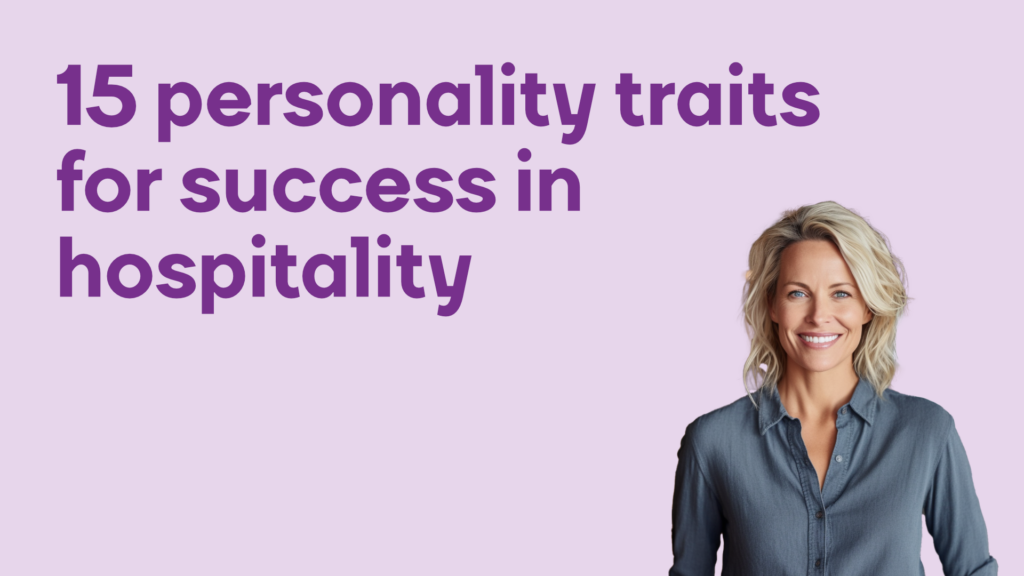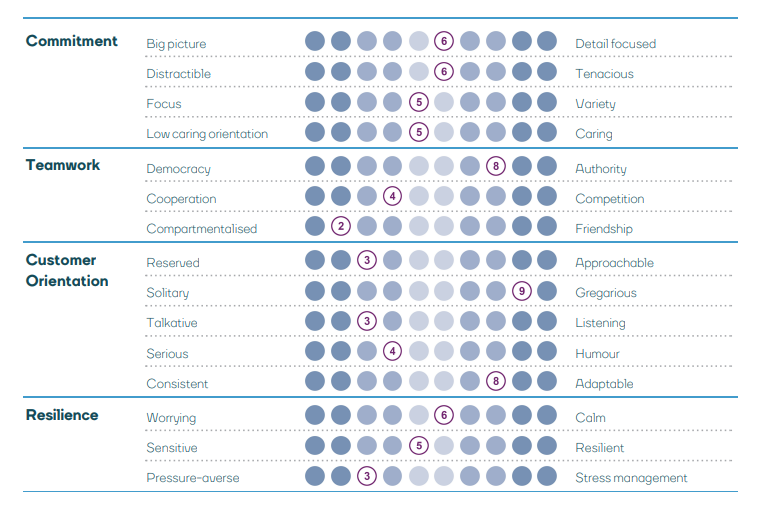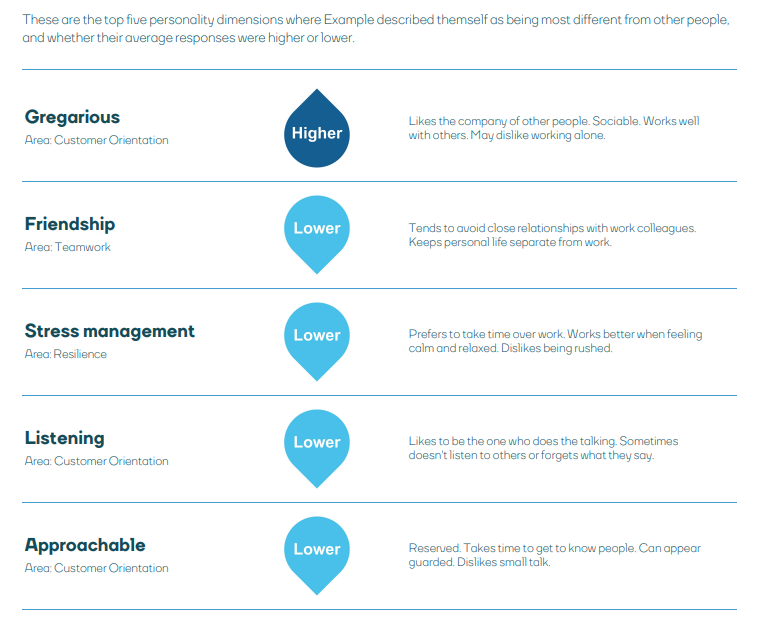To excel in hospitality roles requires specific personality traits and competencies. People working in the hospitality industry are in constant contact with customers, providing services that can make or break an individual’s experience, and hiring the right personality can be the difference between a guest returning or seeking alternatives. It is, therefore, crucial to identify and effectively measure the predictive success traits when hiring for hospitality roles.

Clevry’s personality questionnaire for hospitality roles is designed to assess a candidate’s personality and behavioural suitability for positions in the hospitality industry, including roles like Waiting staff, Bar staff, Hotel Receptionists, Porters, and Restaurant and Hotel Managers.
Success traits in hospitality
Below are 15 personality traits that we have found, through extensive research, to be essential for success in hospitality, bucketed into four categories: Commitment, Teamwork, Customer Orientation, and Resilience.
Commitment
A foundation stone in hospitality. It’s about putting your heart into the role and showing up with your best self.
- Detail-focused: The smallest detail can make the biggest difference in the hospitality industry. Whether setting a table, preparing a dish, or ensuring a room is impeccably clean, noticing and acting on the finer details ensures guests have a flawless experience.
- Tenacious: The hospitality environment can be fast-paced and demanding. Individuals with the tenacity to persist and see tasks through to completion, even mundane ones, are invaluable.
- Variety: Those who thrive on variety are well-suited to hospitality. The industry offers numerous roles and tasks, and having an employee who can juggle multiple projects simultaneously ensures smooth operations.
- Caring: Genuine care for others is the heartbeat of hospitality. Individuals motivated by making others feel welcome and comfortable are naturally inclined to provide exceptional service.
Teamwork
There’s no ‘I’ in a team, right? And in hospitality, teamwork is the magic potion.
- Authority: In any establishment, especially one that deals with numerous guests, a strong organizational structure is required. People who respect authority and have leadership qualities ensure that tasks are delegated appropriately, problems are addressed promptly, and a high standard of service is maintained. Their ability to guide and inspire their teams ensures everyone works cohesively, enhancing the overall guest experience.
- Competition: The hospitality industry is saturated, with businesses vying for a share of customer attention. Those with a competitive streak constantly strive for improvement, setting the bar higher each time. This push for excellence drives innovation, leading to unique offerings that distinguish an establishment from its competitors.
- Friendship: Building genuine connections makes guests feel valued. Employees who view their interactions as an opportunity to foster friendships ensure guests feel more than just patrons; they feel like part of the establishment’s community. This fosters loyalty, leading to repeat visits and positive referrals.
Clevry’s assessment measures distinct personality traits, not broad domains (personality types). Results show strength of preference on a scale rather than categorizing people on one side or another.

Customer Orientation
This is where the rubber meets the road in hospitality.
- Approachable: Guest inquiries, concerns, or feedback are inevitable. Approachable employees create an environment where guests feel comfortable voicing their thoughts. This not only aids in immediate problem resolution but also provides insights into areas of potential improvement.
- Gregarious: The very nature of hospitality revolves around people. Gregarious employees, who genuinely enjoy engaging with others, ensure guests are always at ease. Their natural ability to strike conversations or share stories can turn ordinary interactions into memorable ones.
- Listening: Tailoring experiences requires understanding guest needs. By actively listening, employees can provide personalized services, be it customizing a room setting or recommending a dish. Such attention to individual preferences fosters goodwill and enhances satisfaction.
- Humour: A light-hearted and fun environment can transform a guest’s experience. The ability to infuse humour makes interactions pleasant and memorable. It can alleviate tense situations, brighten a guest’s day, or simply add an element of fun to the experience. It makes establishments more human, relatable, and enjoyable.
- Adaptable: The hospitality sector can be unpredictable. Every guest is unique, and situations can change rapidly. Adaptable employees can cater to diverse needs and shift their approach as situations demand, ensuring that service delivery remains consistent and guests always leave satisfied.
View the output from Clevry’s Hospitality assessment by downloading a sample report below
Resilience
Hospitality can throw curveballs, and these traits ensure they’re caught with grace.
- Calm: The fast-paced nature of hospitality can sometimes lead to crises. Calm employees serve as anchors during such times. Their ability to make rational decisions under pressure ensures that disruptions are minimal and guests remain unaffected.
- Resilient: Criticism is part and parcel of the hospitality world. Employees who take feedback in stride and use it constructively ensure consistent improvement. Resilient employees view criticism as an opportunity for growth, ensuring that the service keeps evolving and improving based on genuine guest feedback.
- Stress management: Working efficiently under pressure is a cornerstone trait. Peak seasons, demanding guests, or unexpected issues can elevate stress levels. Employees adept at stress management not only maintain their efficiency but also contribute to a tranquil environment. Their calm presence ensures guests remain unaffected by any internal pressures.

Other assessments for hospitaly hiring
The right personality is one of the key elements of a successful hire for a hospitality role, but using other assessment methods in conjunction will help you make your hiring process even more robust.
Ability tests
Ability tests measure specific skills required in the hospitality industry. These include numerical reasoning tests, essential for roles that involve handling cash or payments, and verbal reasoning tests, which help identify how well candidates can understand and follow instructions in a written form.
Situational Judgement tests
Situational Judgement Tests (SJTs) provide scenarios that candidates are likely to face in their job as a hospitality professional, asking them to choose the best response. Situational Judgement Tests gives valuable insights into candidates judgement and decision-making capabilities.
Learn how Clevry helped one of the UK’s largest budget hotel brands, Travelodge, streamline hospitality recruitment and embed role responsibilities and company values in their candidate selection process. >> Travelodge Case Study
Wrapping up
Recruiting and retaining top-notch hospitality professionals can be challenging, but with the right hiring strategy and assessment tools, you’re one step closer to adding top talent to your team to wow your customers.



